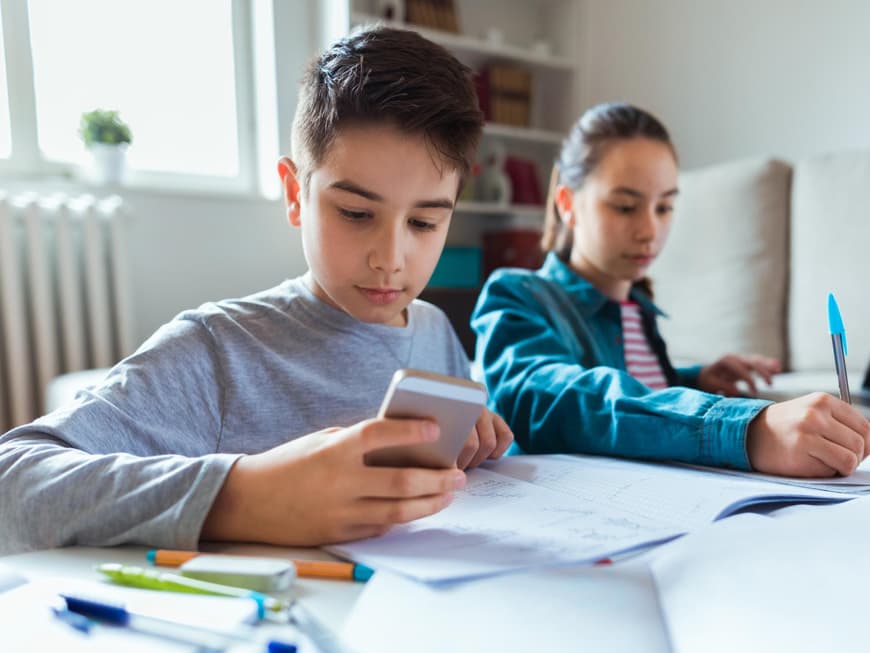
Because I think that the consumption of pornography in connection with children and young people is a very important issue that we cannot avoid today. We can't completely block the internet and protect our children and young people from porn in this way. The only thing we can do is talk to them about it, answer their questions and help them to recognize the difference between porn and reality.
There is (almost) no escape
No, I'm really not in favor of actually watching porn with students in real life. We did that at university. But we were all adults then and could decide for ourselves whether we wanted to or not. Young people are far too often unable to decide for themselves. And that's exactly the problem.
Nowadays, parents equip their children with the necessary technology from a very young age: smartphones, tablets, PCs, often with access to the internet. On 23.05.2016, the Hart aber fair show entitled "Always online - do smartphones make you stupid and ill?" raised the question of the age at which children should be given a smartphone. Opinions differed widely: from the age of eight to between sixteen and eighteen. What did the presenter say about the older age? "Have fun putting it into practice."
The best parental control software doesn't help if it's not installed
We can't avoid technology, but how do we deal with it? There are parents who are familiar with the protection options. They block certain words or install parental control software. There are special media officers who deal with this in detail and ensure that there are suitable protection programs for certain age groups. But parents also have to get to grips with the issue.
Unfortunately, there are enough parents who do not do this. Often simply because they don't know anything about it themselves. And even if they do, there are still other children and young people on whose devices the forbidden sites can still be viewed. Photos, films and texts can also be sent via WhatsApp and pornographic content can also be found in the lyrics of Bushido, Frauenarzt and other German musicians from the rap scene. And who can control all of this?
Can young people distinguish between reality and fiction?
Hamburg-based sex researchers Gunter Schmidt and Silja Matthiesen interviewed 160 young people aged between 16 and 19 in the big city about their pornographic behavior. How do they use pornographic material and what are their experiences with it? Access is usually via the Internet, and the usage behavior of boys and girls is very different: "Not even 10% of girls, but more than 90% of boys have more than sporadic experiences with pornography; none of the women surveyed, but a third of the young men use or used pornography particularly often, namely twice a week or more often, over a longer period of time."
However, it also appears that boys and girls are very well able to distinguish between fiction and reality. According to media educator Anne Dahm, film industry inspector at the Voluntary Self-Regulation Body of the German Film Industry (FSK), 12 to 13-year-olds are also quite capable of doing this. We can also support this process.
Resistance to sex education
In my view, the question is not so much how we can protect children and young people from pornography, but rather how we should deal with it once it has happened. Keep it quiet? Absolutely not!
When you talk about sex education at school, you see the big P in the eyes of many parents.
- They don't want their children to be sexualized at school at an early age and they themselves as parents to be incapacitated on this subject.
- Some would prefer to keep the subject of sexuality away from their children altogether.
This has gone so far that in cities such as Hamburg and Dresden, the group "Concerned Parents" is calling for a demonstration against the "sexual education of diversity". This form of sex education is primarily about teaching children and young people about the diversity of sexual orientations and identities. In my opinion, not all of the exercises described in the accompanying book are absolutely necessary to give children and young people an understanding of this diversity. The much-cited modernization of a brothel certainly still has some way to go. But here, too, the fears of parents could be addressed directly through cooperation.
Teaching media skills is preventative work
Ultimately, we cannot prevent contact with pornography at some point, regardless of the context. It is therefore important to teach media literacy on the subject of pornography. Topics could be:
- Not all porn is the same.
- Dealing with the gender stereotypes conveyed.
- There is a difference between porn and real-life sexuality.
- Discussions about experiences, desires and fears that arise from the consumption of pornographic content.
- Sexuality is more than pleasure and orgasm.
We are not making children and young people curious. They already are, and that's a good thing. Nor do we give them "stupid" ideas in the first place. They have them anyway. Because the more forbidden something is, the greater the power it exerts. And why shouldn't we involve the parents in this work? Parents' evenings before and after are certainly a better way than excluding the topic from the outset.
Anja Drews - qualified sex educator for ORION






